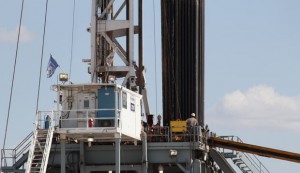What Oklahomans Need to Know About the Escalating Oil and Gas Tax Debate
-
Joe Wertz

Joe Wertz / StateImpact Oklahoma
Crews at work on a Helmerich & Payne drilling rig in western Oklahoma.
A tax credit for horizontal drilling expires next year, and, as we’ve reported, the looming deadline has spurred lawmakers to discuss overall changes to Oklahoma oil and gas taxes.
Or, as State Treasurer Ken Miller puts it, an “opportunity to modernize the state’s energy tax policy.”
A 7 percent tax is levied on most oil and gas production, but the Legislature in the ’90s created a tax credit for horizontal drilling that reduced those taxes to 1 percent for the first 48 months of production.
Horizontal drilling was an experimental and rarely used technique when the tax credit was created, but now most new wells in Oklahoma are drilled horizontally, and the cost of the incentive has ballooned. Drilling rebates and refunds totaled about $173 million last fiscal year.
The left-leaning Oklahoma Policy Institute opposes the tax credit and reducing oil and gas taxes. Oklahoma’s Secretary of Finance Preston Doerflinger has questioned the horizontal drilling tax credit, too, but some GOP budget leaders seem eager to cut oil and gas taxes.
From the Associated Press’ Sean Murphy:
Gov. Mary Fallin and Senate President Pro Tem Brian Bingman both have signaled a willingness to discuss adjusting the tax incentive with industry leaders, but former House Speaker T.W. Shannon endorsed the idea of making the 1 percent rate permanent.
But not all Oklahoma Republicans agree, The Oklahoman‘s Adam Wilmoth reports:
“But I think 1 percent is totally and unequivocally ridiculous,” State Rep. David Dank of Oklahoma City told the paper.
Dank has proposed a novel compromise: A variable gross production tax between 2 and 4 percent that would be based on the number Oklahomans each oil and gas company employs.
“Chesapeake and Devon and Continental have buildings here in Oklahoma City that are full of their employees who are contributing to our economy,” Dank said. “When they drill and take oil and gas out of the ground, they’re contributing to Oklahoma by hiring our neighbors.”
Dank’s plan doesn’t sit well with Oklahoma’s oil and gas industry, however. Chad Warmington, the president of Oklahoma Oil & Gas Association, questioned whether the proposal would violate the state constitution and issued this statement:
“If this solution is a good way to “reward producers who employ our neighbors”, I would hate to see what the proposal would look like if he were trying to punish us for spending $12 billion drilling wells in Oklahoma in 2012 and creating 29,000 new wage and salary jobs.
The Oklahoma Independent Petroleum Association doesn’t like Dank’s plan either, president Mike Terry told The Oklahoman:
“It seems that this is a solution looking for a problem,” Terry said.
“Oklahoma’s current tax structure for the oil and natural gas industry works,” he said. “It encourages new drilling and increased oil and natural gas production. Gross production tax payments are 20 percent higher today than they were just a year ago, and much of that new revenue can be attributed to increased oil and natural gas production.
